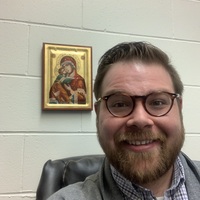Take me to the vocational discernment course!
by John J. Vizza, MDIV, MCL, JCL, MS
Discernment, especially in Catholic circles, is often the term most applied when one is in vocational discernment as if, after one has decided which course of life to take, all other discernment ceases. Discernment, however, should also apply prior to making any big decision in life: buying a house, moving to a new state, changing jobs or even changing qualities or characteristics about oneself.
Today, now more than ever, discernment is needed in this world so fractured by unrest – a world of fragile peace and broken promises. Where some choose to respond within seconds to others, where some choose to respond with 280 off-the-cuff characters, where some choose to respond as if another human life was not on the other side of the screen, we as discerning people must not be manipulated by the cult of instantaneity. Discernment must be a driving force of our daily life. This is good because discernment will help us to pause, to slow down and to be more prudent.
The Oxford English Dictionary tells us that the word “discern” comes from the Latin word discernere, from dis-‘apart’ and cernere ‘to separate’. Therefore, discernment means separating our personal desire from our baptismal calling and pausing and praying to discover where God’s will is in all the mess. That is, discernment separates the incessant need to be heard, to be liked and to be first, from the call to be humble, to be hated and to be last and least of all (Luke 14:11; John 15:18; Mark 9:35).
However, discernment is also an action word! How many times have we fallen back on the phrase, “I’m still discerning,” as a way of being indecisive? The One who discerned perfectly, of course, was Christ, whose mission was intimately, and only, a taking up of the will of His Father. During His earthly ministry, Christ gave us the tools necessary to be active discerners. Consider these three:
Be Among the People
In this time of social distancing and social isolation, being among the people may seem like a thing of the past. Psychologically speaking, we are social beings and we are called to be in community with one another. Theologically speaking, we are made in the image and likeness of the Godhead – a Trinity of Persons in perfect communion with one another. We know that Jesus many times went to the home of saints and sinners alike and had a meal with them. There’s the old adage that if you want to get to know someone well, sit at table with them. Discernment in many ways is confirmed among the people. It’s why seminarians and religious do pastoral internship years in parishes and schools, and it’s why pastors reach out to family and friends prior to couples being married to get their opinion. We want people from the community, our family and our friends to also help us to confirm God’s will for us. It is a key element of discernment.
Trust Those Closest to Us
On at least three occasions, Jesus takes only Peter, James and John to those most intimate and most sacred of spaces and places in His ministry (we recall, at least, that they went with Christ to the mountain during the Transfiguration and to the Garden in Gethsemane during His Passion). Again, Christ shows us that in our lives, we move from a community discernment, to a more intimate discernment with a few close and very trusted confidants. Sometimes people tend to want to overshare intimate details about their discernment process with anyone who will listen. Jesus gives us a better example of having just those few trusted friends in whom we first confide our vulnerabilities and our anxieties, our joys and our hopes.
Climb the Mountain to Pray
Many times, in the Gospel, Jesus goes off to pray, most often before or after a significant event in His ministry. After He was baptized by John and before His public ministry, we read that Jesus “was led by the Spirit” (Mt. 4:1) into the desert to fast and pray. When Jesus heard about the death of John the Baptist, “[Jesus] withdrew in a boat to a deserted place by himself” (Mt. 14:13) and immediately following that we read of the miracle of loaves and the fish (Mt 14:14-21). After the miracle of the loaves and fish, the apostles leave and Jesus goes up the mountain, alone, to pray (Mt. 14:23; Mk. 6:46). Jesus teaches us that in order to discern well, we have to have a life rooted in personal prayer with God. We move from a discernment in community, to one with close family and friends to one of pure intimacy with our God. Whatever comes and goes in our daily life, our prayer has to remain constant. It might not always be able to be a formal prayer setting like Liturgy of the Hours in a Chapel, but we always need to take those quiet moments and make them holy through prayer.
People most often associate the famous words of Augustine, “Late have I loved You, O Beauty, ever ancient, ever new, late have I loved You” with an understanding of coming to one’s vocation later in life. While this is true of Augustine, we may often pray this same prayer collapsing on our beds at the end of the night, in those moments when our prayer falls below what it should be. And yet, discernment demands these three pillars in order to separate out our own desires from that of God’s singular will for us.
About John J. Vizza, MDIV, MCL, JCL, MS (Psychology)
 John J. Vizza, MDIV, MCL, JCL, MS (Psychology) is a Canon Lawyer who has done post-secondary studies in psychology and theology over the past twelve years. His main work is in dealing with Declaration of Nullity cases in Diocesan Tribunals and canonical consultation in about 10 Arch/Dioceses in the US and Canada. This work ranges from being a Psychological Expert in nullity trials to working as a Canonical Advocate in penal law matters for Priests, Religious and Lay Faithful. He has a special interest in working to build safer environments in the Church following the sexual abuse scandals and wrote his licentiate paper on this topic. He has taught canon law and pastoral counseling in post-secondary institutions and formation programs. He has served as a councillor for the Alberta Health Services Health Advisory Council, a provincial appointment, where he raised awareness for mental health issues, especially among youth and young adults. He is a member of seven professional associations including the Canadian Association for Spiritual Care, the National Catholic Bioethics Center and the Catholic Psychotherapy Association. He is originally from Philadelphia and is now living in Edmonton, Alberta, Canada with his wife and three daughters (with a fourth on the way). They are all Ukrainian Catholics. Contact John Vizza.
John J. Vizza, MDIV, MCL, JCL, MS (Psychology) is a Canon Lawyer who has done post-secondary studies in psychology and theology over the past twelve years. His main work is in dealing with Declaration of Nullity cases in Diocesan Tribunals and canonical consultation in about 10 Arch/Dioceses in the US and Canada. This work ranges from being a Psychological Expert in nullity trials to working as a Canonical Advocate in penal law matters for Priests, Religious and Lay Faithful. He has a special interest in working to build safer environments in the Church following the sexual abuse scandals and wrote his licentiate paper on this topic. He has taught canon law and pastoral counseling in post-secondary institutions and formation programs. He has served as a councillor for the Alberta Health Services Health Advisory Council, a provincial appointment, where he raised awareness for mental health issues, especially among youth and young adults. He is a member of seven professional associations including the Canadian Association for Spiritual Care, the National Catholic Bioethics Center and the Catholic Psychotherapy Association. He is originally from Philadelphia and is now living in Edmonton, Alberta, Canada with his wife and three daughters (with a fourth on the way). They are all Ukrainian Catholics. Contact John Vizza.
